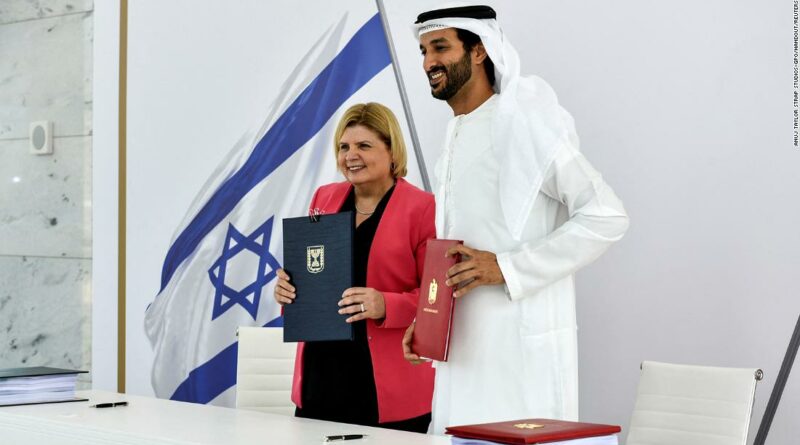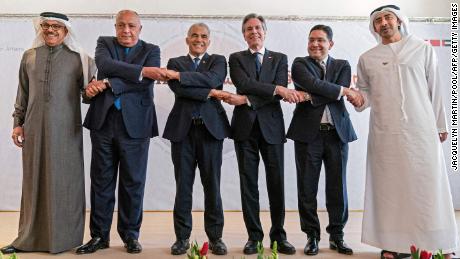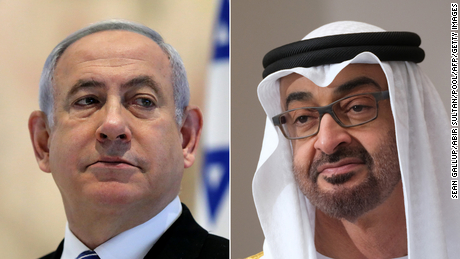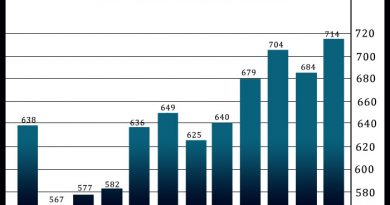Adolf Eichmann stands in his bullet-proof glass cage to hear Israel's Supreme Court unanimously reject an appeal against his death sentence in Jerusalem on May 29, 1962.
A version of this story first appeared in CNN’s Meanwhile in the Middle East newsletter, a three-times-a-week look inside the region’s biggest stories. Sign up here.
Abu Dhabi, UAE (CNN)There was a time in the United Arab Emirates when the depiction of the Star of David on a t-shirt sold in local markets could prompt investigations by officials charged with policing the country’s boycott of Israel.
But much has changed since then. Nearly two years ago, the UAE formally ended its near-half-century boycott, and on Tuesday, it became the first Arab country to sign a free trade agreement with the Jewish state. The pact was described by UAE trade minister Thani Al Zeyoudi as “a new chapter in the history of the Middle East.”
If trade is a barometer of how serious the UAE is about its nascent partnership with Israel, then the numbers speak for themselves. The agreement would lift trade between the two nations to more than $10 billion within five years, from what Israel’s Central Bureau of Statistics says was about $1.2 billion last year.
The Gulf nation had also allocated $10 billion for investments in Israel last year, singling it out as one of its main future economic partners along with seven other nations as the focus of its foreign policy shifts to business.
Experts say that the prize for Israel is much bigger than the population of roughly 10 million the Gulf nation offers, because the deal could open up access to the broader Middle East that it hasn’t been able to tap yet.
Here’s what you need to know about the pact and UAE-Israeli trade:
What does the pact entail?
Tariffs will be removed or reduced on 96% of goods traded between the nations, including food, medicine, diamonds, jewelry, fertilizers and other chemicals.
A majority of duties would be waived immediately, and others would be removed up to five years from now. Those projects that will be subject to tariffs will be charged a lower rate.
Dorian Barak, co-president of the UAE-Israel Business Council, expects to see about 1,000 Israeli-owned companies operating from or through the UAE by the end of the year, including subsidiaries of Israeli companies, representative offices, sales operations, distributorships, and new ventures.
What does each side gain from trade?
Research provided by Paul Rivlin, an economist at Tel Aviv University, shows that the value of Israeli imports from the UAE was more than double its exports last year, but other experts say that Israel has a lot more to gain from trade with the UAE in the future.
The UAE’s exports to Israel are expected to grow 0.5% by 2030, according to state-run Emirates News Agency, WAM, and the FTA would add $1.9 billion to the nation’s economy within five years.
The UAE wants high-net-worth individuals, tourists, entrepreneurs, startups, and cutting-edge technologies, says Robert Mogielnicki, a senior scholar at the Arab Gulf States Institute in Washington, but “Israel will probably reap greater direct economic rewards. Israelis just have much more to gain than Emiratis do.”
The UAE would see an influx of Israeli companies looking to set up regional headquarters from which to target business in the greater Middle East, South Asia and the Far East, says Barak.
Given Dubai’s status as a regional export hub, does trade with the UAE open Israeli products up to a wider market?
Israelis are looking at Dubai as a hub from which to engage with the broader Middle East, the Indian subcontinent, and the Far East, says Barak. “This would be transformational for Israeli business in the region.”
The UAE, he says, is set to become the main regional export and re-export market for Israeli goods. “I expect you’ll see Israeli products appearing on store shelves and in factories” through the region now.
Mogielnicki, however, says that Israel is a controversial player in the region, so trade with the UAE would give it a foot in the door to an untapped regional market but not “a VIP pass.”
Business between Israeli firms and state and private firms in the Gulf already exists, says Karen Young, a senior fellow at the Washington-based Middle East Institute. The trade agreement would “help newcomers feel more comfortable and encourage more direct trade and investment.”
Will we see Israeli products on Saudi shelves then?
Saudi Arabia is the biggest Arab economy and access to its market is coveted. The kingdom recognizes that leverage, experts say, and it demonstrated that last July, when it excluded Israeli products exported from the UAE from preferential tariff concessions under agreements with fellow Gulf countries.
“Saudi Arabia isn’t just going to give away its market to Israelis via Dubai,” Mogielnicki said. “The Saudis are going to want to secure something big in return for access to the Gulf’s biggest market.”
Gulf nations, with whom the UAE has free trade agreements, account for a large proportion of Dubai’s exports and re-exports.
What does this mean for the Arab boycott of Israel?
“The Arab boycott has weakened over many years and the Israel-UAE FTA is a major nail in its coffin,” says Rivlin.
Trade with the UAE may not spell the end of the Arab boycott of Israel, says Barak, but make it “irrelevant from a business perspective.”
The digest
Turkey says Saudi Crown Prince to visit
Turkish Foreign Minister Mevlut Cavusoglu said on Tuesday that Ankara and Riyadh were in agreement for a visit by Saudi Crown Prince Mohammed bin Salman to Turkey, but no date had been set yet.
- Background: Ties between the regional rivals were strained after a Saudi hit squad killed Saudi journalist Jamal Khashoggi at the kingdom’s consulate in Istanbul in 2018. Cavusoglu said Prince Mohamed’s visit was initially scheduled for this month, adding that efforts to normalize strained ties with Riyadh were moving fast.
- Why it matters: A potential visit by the Saudi crown prince would follow a trip by Turkish President Recep Tayyip Erdogan to Saudi Arabia in April, marking an end to tensions between the two as Turkey looks for ways to shore up its economy amid an economic crisis.
Russia’s Wagner Group linked to landmines, booby traps in Libya, Human Rights Watch says
The Russian Wagner Group was linked to the use of banned landmines and booby traps in Libya between 2019 and 2020, said Human Rights Watch on Tuesday.
- Background: A private military security contractor, Wagner Group has been previously linked to fighting in Libya, allegedly backing eastern-based commander Khalifa Haftar and his Libyan National Army during their attacks on the Libyan capital between 2019 and 2020, according to Human Rights Watch and UN expert reports. Findings showed that deadly landmines prevented citizens from returning home after the war. Human Rights Watch asked for a “credible and transparent international inquiry” that brings justice to those “unlawfully killed and maimed by these weapons.”
- Why it matters: The US has designated the group a Russian military “proxy force” that has operated in the Middle East and Africa for years. In March, British intelligence said that Wagner was deployed in eastern Ukraine, a month into Russia’s invasion. The Kremlin denies any connection to the group.
Russian foreign minister meets Gulf counterparts ahead of OPEC+ meet
Russian Foreign Minister Sergei Lavrov met foreign ministers from the Gulf Cooperation Council states in Riyadh on Wednesday ahead of a meeting of oil exporting states to decide on production.
- Background: Lavrov had earlier met his Saudi counterpart and both men praised the level of cooperation inside OPEC+, the Russian foreign ministry said. The alliance will decide on Thursday whether to continue with its modest oil output hike.
- Why it matters: Lavrov’s meetings came shortly after the European Union agreed on significant cuts to imports of Russian crude as part of its latest sanctions linked to Moscow’s invasion of Ukraine. Western states have called on oil producers to raise output in order to curb global inflation and help stifle Russia’s war effort.
What to watch
Qatar Airways CEO speaks to Becky Anderson about the country’s plan to operate more than 160 daily flights to shuttle spectators from the region for the 2022 football World Cup.
Watch the interview here:
"We always wanted to share the benefit of this tournament with all of our neighbors."@qatarairways CEO Akbar Al Baker tells me why the country has created a unique shuttle flight service within the region for the #FifaWorldCup2022: pic.twitter.com/ZNzur0IVp4
Around the region
Congratulations to the winner! Mohamed Alnaas has just been announced as the winner of this year’s #ArabicFiction2022 with Bread on Uncle Milad’s Table: https://t.co/ehZILAQMAW #MohamedAlnaas #winner pic.twitter.com/RuFYunCFDr
A book about gender roles in Libya has won a prestigious prize for Arabic fiction, but it has also led to some backlash against the author.
Mohammed Alnaas, 31, late last month became the first Libyan and youngest author to win the International Prize for Arabic Fiction (IPAF) for his debut novel “Bread on Uncle Milad’s Table”.
The book explores gender roles and challenges traditional ideas of masculinity. Set in a remote village in Libya, the story revolves around the main character, Milad. After getting engaged, Milad’s family life becomes the talk of the town when he pursues his passion for bread-making while his fiancé Zeinab works to support the house.
Hearing of the gossip, Milad goes on to publicly question society’s entrenched ideas around gender.
“The Libyan man is a victim of the traditional laws just like the Libyan woman, and although the women’s struggle against the social and traditional laws is clear, the men’s is not,” Alnaas told CNN. “[Men] are in a trap of their own because they always have to prove to the people that they are men, tough men, strong men. They get enslaved to that picture of the ideal man and become machines in the social order.”
The win was celebrated by Libyans across social media, but the book has also generated controversy. Alnaas laments the “campaign” about the ethics of the book that was launched on social media, noting that some of those who had congratulated him deleted their posts.
Under former Libyan Leader Moammar Gadhafi, state censorship put a stranglehold on literature. Books that didn’t toe the official line — as outlined in Ghadhafi’s infamous “Green Book” — were banned.
The uprising of 2011 opened the door for the consumption of once-banned books, but Ghadhafi-era laws have still been used to clamp down on freedom of expression.
Describing his view on the current landscape for Libyan literature, Alnaas told CNN “it’s struggling, however, it’s fighting back.”
The IPAF, sponsored by the Abu Dhabi Arabic Language Centre, is considered to be the most prestigious literary prize in the Arab world. Alnaas’ book will be translated into English.
By Nicholas Pearce
Time capsule
Adolf Eichmann, one of the architects of Nazi Germany’s “Final Solution,” was executed 60 years ago this week in Israel.
Born in Germany in 1906, he joined the Nazi’s elite SS organization in 1932 and quickly rose through the ranks. Ten years later, he carried out a plan to exterminate all European Jews in an operation called the “final solution to the Jewish question.”
Eichmann was responsible for the identification, assembly, and transportation of millions of Jews in World War II. After Germany’s defeat, he was captured by US forces but escaped in 1946 before standing trial. He hid in Argentina until 1960, when was captured by Israeli agents in Buenos Aires in what became known as “Operation Finale.”
Eichmann was smuggled out by the Israelis to stand trial in Jerusalem. In December 1961, Eichmann was found guilty on all charges, and on June 1 of 1962, he was hanged in Tel Aviv.
By Mohammed Abdelbary
Source: Read Full Article





